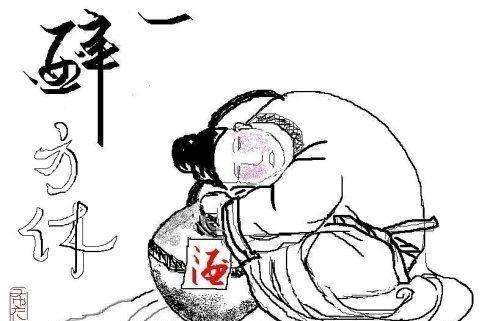The ancients always said "wine into the intestines", it seems that in the traditional concept, when we drink, the liquor after the entrance is directly into the "intestine" this part. There is even a saying that wine has an exclusive place in the "intestine". This is what the ancients said, "wine has different intestines", or "wine intestines".
"Wine sausage" is naturally a hypothetical thing, but the ancients have many records about it. Wu Renchen, a scholar of the Qing Dynasty, recorded in the "Spring and Autumn of the Ten Kingdoms, Min, JingzongJi": "Emperor Yue: 'Wei Yue is very small, why drink so much?'" Left and right: "Wine has a different intestine, it does not have to grow up." This is a story that happened during the Five Dynasties and Ten Kingdoms period, when Wang Yanxi, the emperor of the Min Dynasty, asked his subordinate minister Zhou Weiyue: You are so short, why is the amount of alcohol so large? Zhou Weiyue replied: After the wine enters my body, there is another pair of "intestines", which has nothing to do with the height and size of the body. Two great poets of the Tang Dynasty, Meng Jiao and Han Yu, also wrote in the "Tongsu Lian sentence" that they cooperated: "Open the wine sausage for the jun, and drink upside down and dance together." It can be seen that the ancients were still relatively convinced of this concept.
In addition, the ancients used to describe spirits, generally two ways of expression. One is to get drunk after drinking, or even get drunk for a long time. Another, more intuitive and appalling way to say it is "elimination of intestines", and "elimination of intestines" here is indeed literal.
There are many examples of the former, such as the "thousand days of drunkenness" brewed by Liu Bailuo that we talked about in the previous article, and the Du Kang fine wine that made Liu Ling drunk for three years. We can also mention one more briefly today. Legend has it that the courtiers, hermits of the Han Dynasty, and dongfang Shuo, who later soared into immortality, got the "Elk Chin Jujube" at zhenling Mountain, and with this strange jujube, it can be used to brew spirits that make people drunk and difficult to wake up. Written in the Kangxi Dynasty of the Qing Dynasty, the Ancient and Modern Book Integration, Grass and Wood Jujube records: "Elk Qin Jujube, out of the True Ling Mountain... The Orient wanders its land... Each episode of the courtiers, take a pill into the water and a stone, instantly carved into wine, the taste is more than mellow mash, called elk Qin wine, also known as true Chin wine, xian xue wine, incense does not stop, drinking is not awake for many years. ”

The second kind, that is, the wine of "eliminating the intestines", is also recorded, and the name is the simple and crude "intestinal liquor". Wang Jia, a scholar of the Jin Dynasty, recorded in the "Collecting Relics and Jin Current Events": "Zhang Hua was nine mashed wine, with three wei stained koji... In order to make wine mellow, long contains teeth moving, if drunk, do not laugh and sway, make people liver and intestines rotten, common people call it intestinal wine. "It's a bit appalling to make people's livers and intestines go down after drinking it."
The elimination of spirits is undoubtedly an exaggeration of the ancients, but it can also be understood as a euphemism. The ancients seem to want to warn us in this way: wine can dispel sorrows and intestines, drink less can eliminate sorrow, and drinking more can be harmful and useless.
Headline wine tasting day is coming Welcome to my live room to talk about wine and more large coupons to take